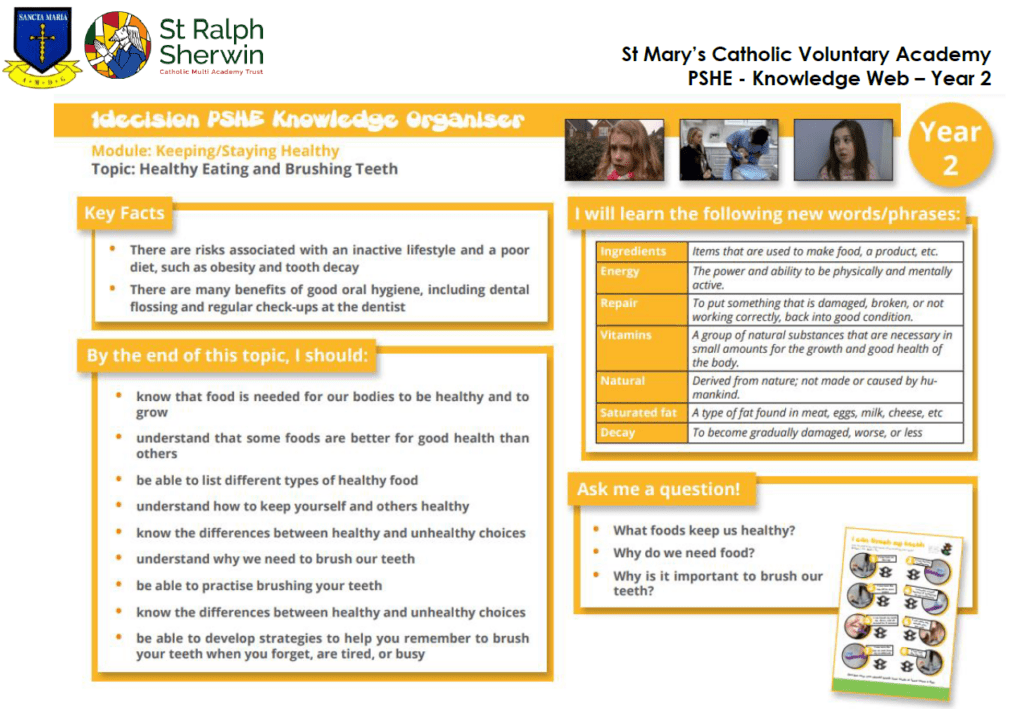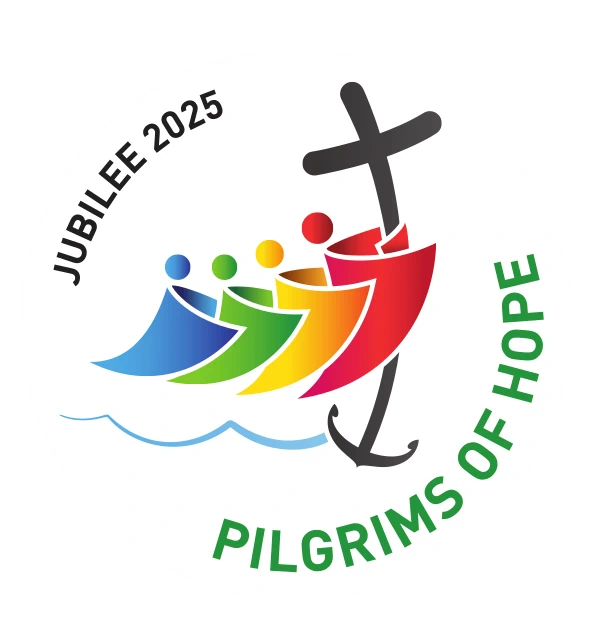Aims & Objectives
At St Mary’s we strive to create an environment where children feel that their social and emotional needs are met and nurtured. We believe that PSHE helps to give children the knowledge, skills and understanding they need to lead confident, healthy, independent lives and to become informed, active and responsible citizens. We recognise that social and emotional wellbeing plays a fundamental and central part in the life of our school and is key to effective learning and achievement.
PSHE at St Mary’s makes a significant contribution to the spiritual, moral, social and cultural development of the children as well as their behaviour, safety and wellbeing. In doing so the children will develop the values, qualities and attributes needed to thrive as individuals, family members and members of modern British society.
The objectives of teaching PSHE at St Mary’s Catholic Voluntary academy are:
PSHE in our school aims to equip pupils with the skills to:
- develop self-confidence and self-responsibility
- develop a safe and healthy lifestyle – including creating a sustainable and safe travel culture
- develop the ability to form good relationships
- learn to respect the differences between people
- explore, clarify and if necessary challenge, their own and others’ values, attitudes, beliefs, rights and responsibilities
- prepare to play an active role as citizens
Where children have developed these skills, they will be motivated and equipped to:
- be effective and successful learners
- make decisions about their own lives which will keep them healthy and safe
- make and sustain friendships
- deal with and resolve conflict
- solve problems
- manage strong feelings such as frustration, anger
- work and play cooperatively
- recognise and stand up for their rights and the rights of others
- understand and value the differences and commonalities between people
We intend to achieve these aims through:
- promoting a school ethos that values all individuals
- providing children with accurate and relevant knowledge
- providing a planned, developmental programme of learning through which children acquire the knowledge, understanding and skills they need to manage their lives now and in the future.
- Relationships and Sex Education (RSE), One Decision PSHE programme and coverage of the PSHE association curriculum, CORAM SCARF input and resources.
- developing cross curricular links
- a range of opportunities and resources to promote mental health and wellbeing.
- outstanding pastoral care
How the Subject is Planned
Foundation Stage
To ensure that all children are kept healthy and safe the Nursery and Reception classes follow the Early Years Foundation Stage.
One of the three prime areas particularly crucial for igniting children’s curiosity and enthusiasm for learning, and for building their capacity to learn, form relationships and thrive is Personal, Social and Emotional development.
We aim for the children to develop a positive sense of themselves, and others; to form positive relationships and develop respect for others; to develop social skills and learn how to manage their feelings; to understand appropriate behaviour in groups; and to have confidence in their own abilities.
This prime area of learning and development is implemented through planned, purposeful play and through a mix of adult-led and child-initiated activity. Play is essential for children’s development, building their confidence as they learn to explore, to think about problems, and relate to others. Alongside which Characteristics of effective learning are being developed throughout the EYFS curriculum.
EYFS follow the One Decision programme. The One Decision Early Years resources have been designed to meet the needs of the Development Matters Framework and cover a number of key areas but, in particular, elements of PSED. Students are guided through the Early Years resources by the colourful Rainbow Drop characters. Throughout these resources, the Rainbow Drops will go on many adventures and learn a lot about the wider world that they live in. Floor book discussions are recorded in our class PSHE book.
Key Stage 1 and 2
Each year group follows the PSHE Scheme of Work ‘One Decision’ This is supplemented with regular circles and mindfulness sessions covering areas of the PSHE curriculum taken from the PSHE association documents.. See separate planning for topics covered.
The following information explains how our PSHE scheme of work, One Decision, is delivered across the school. Currently the RSHE element is delivered from the diocesan approved scheme Journey in Love therefore the units on puberty and conception are not covered through the One Decision scheme.
Marking, Feedback and Reporting
Feedback is an integral part of all lessons; it is an essential tool to enable pupil’s progress. A range of feedback is given during PSHE lessons. Pupils are encouraged by the nature of the One Decision programme to discuss and debate topics, this discussion is supported by the teacher. Verbal feedback by the teacher is given throughout all lessons. PSHE discussion topics are provided weekly by the PSHE lead in sessions called ‘Let’s discuss’ These are intended to encourage class discussion and opportunities to voice feelings and emotions on topical issues. These are recorded in a class floor book. Formative assessment is ongoing and is recorded by the pupils within the one decision work book. Parents will receive a statement of their child’s progress in their personal and social development in their annual report.
Monitoring and Evaluation
The subject leader will monitor the teaching of PSHE and monitor the impact on staff and pupils of all PSHE elements throughout the school.
Resources
All resources for the One Decision programme are in classrooms and stored on the system. Additional resources to support specific areas of PSHE are stored in the PSHE file on the system and updated regularly. Floor books provided for each class. Let’s discuss questions printed off and provided weekly.
Other Strategies/Agencies
Whilst the One Decision programme forms the basis of PSHE teaching and learning within the classroom, a wide range of other strategies are in place, which contribute to the development of the children’s social and emotional wellbeing. See whole school PSHE mapping document.
The school also receives support from the Local Authority advisor and the associated PSHE network, other agencies such as primary Behaviour Support Service, CAMHS and Primary Jigsaw to support the work done within school and to meet the needs of our children.
Role of the Subject Leader
The Subject leader has a variety of roles. These include:
- Taking the lead in policy development and quality assuring PSHE planning, delivery and assessment
- Supporting colleagues in their development and implementation of PSHE
- Monitoring effectiveness and engagement in PSHE and advising the Senior Leadership Team and Governors on action needed
- Using release time to support colleagues and disseminate information
- Ensuring resources are acquired for year groups as and when needed.
- Identify and organise support for pupils in the way of groups i.e. Wellbeing workshop/nurture groups, lego and gardening therapy.
- Keeping up-to-date through research and continuing professional development and attendance at PSHE co-ordinators meetings
- Monitoring Mental Health and Wellbeing across the school, staff and pupils.
- Attending Mental Health and Wellbeing MAT meetings.
- Access training to upskill in area of Mental Health – Mental Health First Aid.





